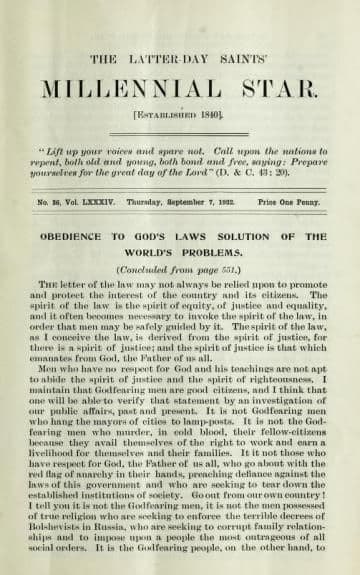Magazine
Concerning the Testimony of the Three Witnesses

Title
Concerning the Testimony of the Three Witnesses
Magazine
The Latter Day Saints' Millennial Star
Publication Type
Magazine Article
Year of Publication
1922
Authors
Morton, William A. (Primary)
Pagination
570–571
Date Published
7 September 1922
Volume
84
Issue Number
36
Abstract
The author responds to an article that claimed that the Three Witnesses “afterwards renounced Mormonism and said that their testimony was false.” The Witnesses never denied their testimony of the Book of Mormon.
CONCERNING THE TESTIMONY OF THE THREE WITNESSES.
There appeared in the Western Evening Standard of the 22nd ult. a letter signed “Plymothian,” in which the writer says that the three witnesses to the Book of Mormon “afterwards renounced Mormonism and said that their testimony was false.” An investigator has written to ask if this statement is true.
In reply we will say that the statement is not correct; not one of the witnesses ever denied his testimony. It was reported at different times during their lifetime that they had done so, and in the earlier editions of the American Encyclopaedia and in the Encyclopaedia Britannica, there are statements to this effect, but they are not true. David Whitmer, who attained the age of eighty-four years, before his death specifically denied them. In an “Address to All Believers in Christ,” published at Richmond, Missouri, in 1887, he said: “It is recorded in the American Cyclopaedia and the Encyclopaedia Britannica, that I, David Whitmer, have denied my testimony as one of the three witnesses to the divinity of the Book of Mormon; and that the other two witnesses, Oliver Cowdery and Martin Harris, denied their testimony to that book. I will say once more to all mankind, that I have never at any time denied that testimony or any part thereof. I also testify to the world, that neither Oliver Cowdery nor Martin Harris ever at any time denied their testimony. They died reaffirming the truth of the divine authenticity of the Book of Mormon.”
In his “History of the Mormon Church,” published in the Americana, Elder B.H. Roberts says: “The evidence relied upon that they (the three witnesses) had denied their testimony to the Book of Mormon was the fact that they either left the Church or were excommunicated from it. Both Martin Harris and Oliver Cowdery, however, returned to the Church and died in full faith and fellowship. And while David Whitmer remained separated from the communion of the Church to the day of his death, he still adhered to the truth of his testimony, as is abundantly witnessed by his ‘Address to all Believers in Christ,’ published only about one year before his death. The trying circumstances under which the witnesses persisted in maintaining the truth of that testimony is also known. Neither separation from Joseph Smith as a companion and associate, nor excommunication from the body religious, brought into existence as a sequence, one may say, of the coming forth of the Nephite record. affected them as witnesses. In the Church and while out of it they steadfastly maintained what they first published to the world respecting the Book of Mormon. They never attempted to resolve the appearance of the angel, the exhibition of the [dates, or hearing the voice of the Lord into hallucination of the mind; nor did they ever attempt to refer this really great event to some jugglery on the part of Joseph Smith. They never allowed even the possibility of their being mistaken in the matter. They saw; they heard; the splendor of God shone about them; they felt his presence. They were not deluded. The several incidents making up this great revelation were too palpable to the strongest senses of the mind to admit of any doubt as to their reality. The great revelation was not given in a dream or vision of the night. There was no mysticism about it. Nothing unseemly or occult. It was a simple, straightforward, open fact that had taken place before their eyes. The visitation of the angel was in the broad light of day. Moreover, it occurred after such religious exercises as were worthy to attend upon such an event, viz., after morning devotional exercises common to all really Christian families of that period—the reading of a scripture lesson, singing a hymn, and prayer; and after arriving at the scene of the revelation, devout prayer was again engaged in by the Prophet and each of the then-to-be witnesses.”—W.A.M.
Subject Keywords
Bibliographic Citation
Terms of use
Items in the BMC Archive are made publicly available for non-commercial, private use. Inclusion within the BMC Archive does not imply endorsement. Items do not represent the official views of The Church of Jesus Christ of Latter-day Saints or of Book of Mormon Central.